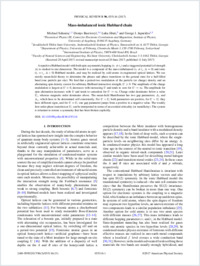Mass-imbalanced ionic Hubbard chain
- Sekania, Michael Theoretical Physics III, Center for Electronic Correlations and Magnetism, Institute of Physics, University of Augsburg, Germany - Javakhishvili Tbilisi State University, Andronikashvili Institute of Physics, Tbilisi, Georgia
- Baeriswyl, Dionys Department of Physics, University of Fribourg, Switzerland - International Institute of Physics, Natal-RN, Brazil
- Jibuti, Luka Faculty of Natural Sciences and Engineering, Ilia State University, Tbilisi, Georgia
- Japaridze, Giorgi I. Javakhishvili Tbilisi State University, Andronikashvili Institute of Physics, Tbilisi, Georgia - Faculty of Natural Sciences and Engineering, Ilia State University, Tbilisi, Georgia
-
11.07.2017
Published in:
- Physical Review B. - 2017, vol. 96, no. 3, p. 035116
English
A repulsive Hubbard model with both spin-asymmetric hopping (t↑≠t↓) and a staggered potential (of strength Δ) is studied in one dimension. The model is a compound of the mass-imbalanced (t↑≠t↓,Δ=0) and ionic (t↑=t↓,Δ>0) Hubbard models, and may be realized by cold atoms in engineered optical lattices. We use mostly mean-field theory to determine the phases and phase transitions in the ground state for a half-filled band (one particle per site). We find that a period-two modulation of the particle (or charge) density and an alternating spin density coexist for arbitrary Hubbard interaction strength, U≥0. The amplitude of the charge modulation is largest at U=0, decreases with increasing U and tends to zero for U→∞. The amplitude for spin alternation increases with U and tends to saturation for U→∞. Charge order dominates below a value Uc, whereas magnetic order dominates above. The mean-field Hamiltonian has two gap parameters, Δ↑ and Δ↓, which have to be determined self-consistently. For UUc they have different signs, and for U=Uc one gap parameter jumps from a positive to a negative value. The weakly first-order phase transition at Uc can be interpreted in terms of an avoided criticality (or metallicity). The system is reluctant to restore a symmetry that has been broken explicitly.
- Faculty
- Faculté des sciences et de médecine
- Department
- Département de Physique
- Language
-
- English
- Classification
- Physics
- License
- License undefined
- Identifiers
-
- RERO DOC 305124
- DOI 10.1103/PhysRevB.96.035116
- Persistent URL
- https://folia.unifr.ch/unifr/documents/306019
Statistics
Document views: 48
File downloads:
- bae_mii.pdf: 143
